Nova revija (Slovene for New Review or New Journal) is a Slovenian publishing house and cultural institute that developed from the literary journal with the same name.
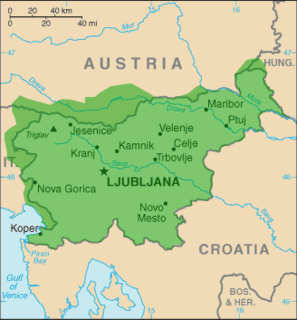
Slovene or Slovenian belongs to the group of South Slavic languages. It is spoken by approximately 2.5 million speakers worldwide, the majority of whom live in Slovenia. It is the first language of about 2.1 million Slovenian people and is one of the 24 official and working languages of the European Union.

Slovenia, officially the Republic of Slovenia, is a country located in southern Central Europe at a crossroads of important European cultural and trade routes. It is bordered by Italy to the west, Austria to the north, Hungary to the northeast, Croatia to the southeast, and the Adriatic Sea to the southwest. It covers 20,273 square kilometers (7,827 sq mi) and has a population of 2.07 million. One of the successor states of the former Yugoslavia, Slovenia is a parliamentary republic and a member of the United Nations, of the European Union, and of NATO. The capital and largest city is Ljubljana.
Nova revija is a Slovene language literary magazine published in Slovenia.
The publishing house Nova revija was founded in 1990. In the 1990s and 2000s, several other magazines were launched within the Nova revija consortium, including a magazine for current political analysis Ampak (since 1999), the journal for legal theory Dignitas, the philosophical journal Phainomena (since 1992), and the journal for religious studies Poligrafi.

A consortium is an association of two or more individuals, companies, organizations or governments with the objective of participating in a common activity or pooling their resources for achieving a common goal.

Religious studies, also known as the study of religion or religiology, is an academic field devoted to research into religious beliefs, behaviors, and institutions. It describes, compares, interprets, and explains religion, emphasizing systematic, historically based, and cross-cultural perspectives.
Since the early 1980s, Nova revija has edited and published works of those modern Slovene authors who were prevented from publishing their complete oeuvre during the Communist period. Those include Edvard Kocbek, Vitomil Zupan, Dušan Pirjevec, and Gregor Strniša.
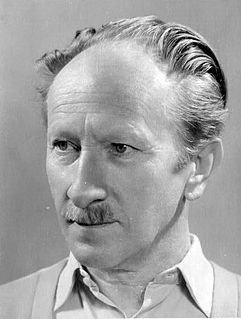
Edvard Kocbek was a Slovenian poet, writer, essayist, translator, member of Christian Socialists in the Liberation Front of the Slovene Nation and Slovene Partisans. He is considered as one of the best authors who have written in Slovene, and one of the best Slovene poets after Prešeren. His political role during and after World War II made him one of the most controversial figures in Slovenia in the 20th century.

Vitomil Zupan was a post-World War II modernist Slovene writer and Gonars concentration camp survivor. Because of his detailed descriptions of sex and violence, he was dubbed the Slovene Hemingway and was compared to Henry Miller. He is best known for Menuet za kitaro, describing the years he spent with the Slovene Partisans. In Titoist Yugoslavia he was sentenced to 18 years in a show trial, and upon his release in 1955 his works could only be published under his pseudonym Langus. He is considered one of the most important Slovene writers.
Dušan Pirjevec, known by his nom de guerre Ahac, was a Slovenian resistance fighter, literary historian and philosopher. He was one of the most influential public intellectuals in post-World War II Slovenia.

Aleš Debeljak, was a Slovenian cultural critic, poet, and essayist.

Drago Jančar is a Slovenian writer, playwright and essayist. Jančar is one of the most well-known contemporary Slovene writers. In Slovenia, he is also famous for his political commentaries and civic engagement.
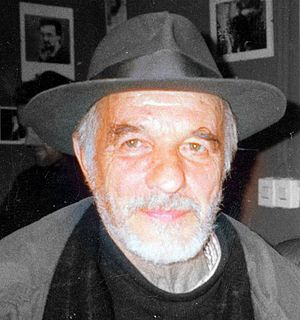
Dane Zajc was a Slovenian poet and playwright. He served as president of the Slovene Writers' Association (1991–1995), and was awarded the prestigious Prešeren Award for lifetime achievement (1981). Together with Edvard Kocbek and Gregor Strniša, he is considered as the most important Slovenian poet of the second half of the 20th century.

Slovene Lands or Slovenian Lands is the historical denomination for the territories in Central and Southern Europe where people primarily spoke Slovene. The Slovene Lands were part of the Illyrian provinces, the Austrian Empire and Austria-Hungary. They encompassed Carniola, southern part of Carinthia, southern part of Styria, Istria, Gorizia and Gradisca, Trieste, and Prekmurje. Their territory more or less corresponds to modern Slovenia and the adjacent territories in Italy, Austria, Hungary, and Croatia, where autochthonous Slovene minorities live. In the areas where present-day Slovenia borders to neighboring countries, they were never homogeneously ethnically Slovene.
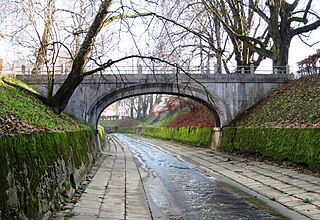
The Rooster Bridge in Ljubljana, the capital of Slovenia, is a footbridge crossing the Gradaščica River in the Trnovo District south of the downtown of Ljubljana. It stands between the Trnovo Bridge and the outflow of the Gradaščica into the Ljubljanica, and connects Gradaščica Street in the northern Krakovo neighbourhood to Eipper Street in the southern Trnovo neighbourhood. These are the oldest Ljubljana suburbs, known for their market gardens and cultural events.
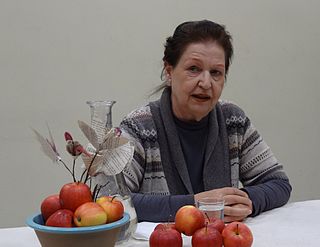
Alenka Puhar is a Slovenian journalist, author, translator, and historian. She is most notable for her 1982 groundbreaking psychohistory-inspired book "The Primal Text of Life" about 19th century social history of early childhood in Slovene Lands, then part of Austro-Hungarian Empire. The book was in 2010 the subject of a television documentary that was in 2010 televised on the national RTV Slovenija. Her grandfather was the photographer and inventor Janez Puhar, who invented a process for photography on glass.

Ljubljanski zvon was a journal published in Ljubljana in Slovene between 1881 and 1941. It was considered one of the most prestigious literary and cultural magazines in Slovenia.
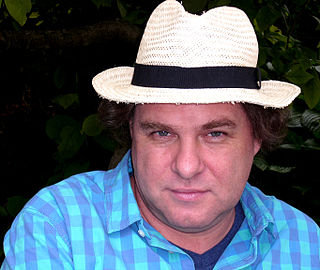
Dean Komel is a Slovenian philosopher.

Igor Škamperle is a Slovenian sociologist, cultural theorist, novelist, essayist, mountaineer and translator.
Peter Vodopivec is a Slovenian historian and public intellectual.
Gregor Tomc also known as Grega Tomc is a Slovenian sociologist, musician and activist. In the late 1970s and 1980s, he was the founder and member of the Slovenian punk rock band Pankrti.
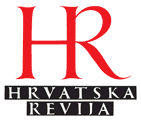
Hrvatska revija is a Croatian quarterly published by Matica hrvatska (MH) based in Zagreb.

Ljubljana school of psychoanalysis, also known as the Ljubljana Lacanian School is a popular name for a school of thought centred on the Society for Theoretical Psychoanalysis based in Ljubljana, Slovenia. Philosophers related to School include Slavoj Žižek, Rastko Močnik, Mladen Dolar, Alenka Zupančič, Miran Božovič and Eva Bahovec. Other scholars associated with the school include philosophers Zdravko Kobe, Rado Riha, Jelica Šumič Riha, sociologist Renata Salecl and philosopher Peter Klepec.
Contributions to the Slovenian National Program, also known as Nova revija 57 or 57th edition of Nova revija was a special issue of the Slovenian opposition intellectual journal Nova revija, published in January 1987. It contained 16 articles by non-Communist and anti-Communist dissidents in the Socialist Republic of Slovenia, discussing the possibilities and conditions for the democratization of Slovenia and the achievement of full sovereignty. It was issued as a reaction to the Memorandum of the Serbian Academy of Sciences and Arts and to the rising centralist aspirations within the Communist Party of Yugoslavia.

Rudi Šeligo was a Slovenian writer, playwright, essayist and politician. Together with Lojze Kovačič and Drago Jančar, he is considered as one of the foremost Slovenian modernist writers of the post-World War II period.
Slovene Studies is a peer-reviewed academic journal covering research on Slovenes as ethnic group and on Slovene culture. It is published by the Society for Slovene Studies and was established in 1973 as Papers in Slovene Studies. It was originally edited by the Slovene linguist Rado Lenček. The journal has been published under its current title since 1979. The editor-in-chief is Timothy Pogacar. The journal addresses international aspects of studies related to ethnic Slovenes and Slovene language and culture.

The Battle of Grčarice was a battle fought in early September 1943 between the National Liberation Army and Partisan Detachments of Slovenia and Slovenian detachment of the Yugoslav Army in the Homeland. The battle was waged in Grčarice in German-occupied Yugoslavia, modern-day Slovenia.
This page is based on this
Wikipedia article Text is available under the
CC BY-SA 4.0 license; additional terms may apply.
Images, videos and audio are available under their respective licenses.

















